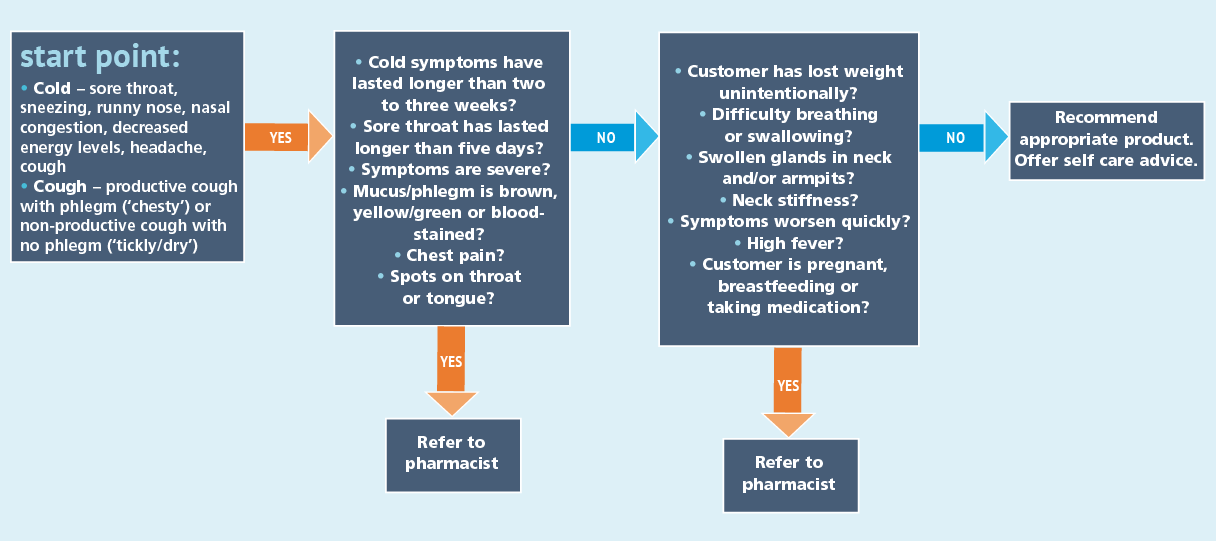10-minute clinic: colds and cough
In Conditions
Follow this topic
Bookmark
Record learning outcomes
This handy 10-minute clinic is designed to act as a quick reference guide that will help you when advising customers in different category areas. The flowchart leads you through the decision-making process to help you respond to customer queries. This month, we look at the advice you can offer and the products you can recommend to customers suffering from colds and cough

At a glance

Facts about flu
With the 2018/19 flu vaccination service now underway, it is important for community pharmacy staff to have up-to-date knowledge about the condition.
Although the symptoms of flu are similar to those of a cold, flu is more serious – it can even be life-threatening in some cases, especially in children, the elderly and people with long-term conditions. There are signs that can distinguish flu from a cold:
- Flu usually appears quickly, within a few hours, whereas a cold comes on gradually
- A cold tends to just affect the nose and throat whereas symptoms of flu can include a sudden fever (a temperature of 38°C or above), aching body, feeling tired or exhausted, dry chesty cough, headache, difficulty sleeping, loss of appetite, diarrhoea or tummy pain, nausea and being sick, as well as nasal congestion and sore throat. The symptoms are similar for children, but can also include pain in the ear and the child may be less active
- Sufferers can feel very unwell for a few days and it usually takes more than a week to fully recover. Flu is also more likely to cause complications such as bronchitis, pneumonia and middle ear infections. Customers with flu can follow the same treatment advice for colds and should ensure they rest and sleep, keep warm and drink plenty of water.
Customers may be entitled to a free flu jab at a pharmacy or GP surgery if they are aged over 65, have a serious medical condition, are pregnant, live in a residential home, or are the main carer for an older or disabled person. NICE has issued guidelines on how to increase uptake of the free flu vaccination among people who are eligible. Pharmacies may also offer flu jabs privately.
Whenever you talk to any customer, remember WWHAM:
Who is it for?
It may not be the customer who needs the treatment. Remember that most cough and cold remedies are not suitable for children under six years old.
What are the symptoms?
Ask the customer to describe all of their symptoms so that you can establish what the most appropriate treatment will be and whether they need to be referred to the pharmacist.
How long have the symptoms been present?
This will help you find out if the customer has something more serious.
Action already taken?
This will help establish whether the customer has used a product that didn’t help or wasn’t appropriate for their symptoms.
Medication?
It is important to find out whether the customer is taking prescribed or OTC medicines and, if so, refer them to the pharmacist.
You don’t have to ask these questions in order, and a customer might give you some of this information without you asking. As long as you get them into the conversation, you should be able to find out the information you need in order to make a recommendation. The golden rule to remember is: if in doubt, refer to the pharmacist. Don’t be embarrassed to ask for their advice as they have a lot of information about products and symptoms to hand that you may not be aware of.
When to refer to the pharmacist
• You should refer children under the age of six, pregnant or breastfeeding women, and anyone who:
• Is coughing up mucus or phlegm that is not clear or white
• Is coughing up blood
• Has chest pain, shortness of breath or is wheezing
• Has had a cough for more than three weeks
• Has a cough that did not start with a cold
• Is a smoker or is worried about their cough
• Has a severe or persistent cough or a suspected infection
• Has a high fever that will not go down or lasts several days
• Is on medication.
Self care tips
- Help prevent viruses from spreading by using disposable tissues and washing hands regularly
- Rest, stay warm and drink plenty of fluids
- Inhale steam to help loosen and bring up phlegm
- Don’t smoke
- Don’t share drinks, cutlery, etc.
Press play on your learning
Brush up on your knowledge of colds and cough with our two-minute learning video.

